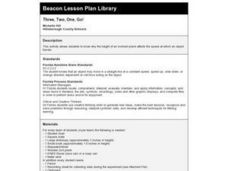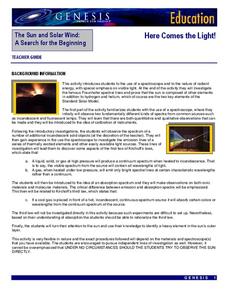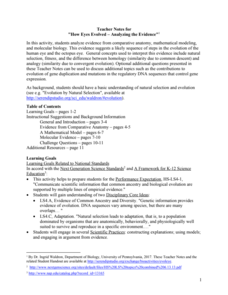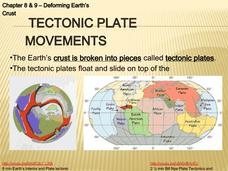Baylor College
Living Things and Their Needs: The Math Link
Enrich your study of living things with these cross-curricular math activities. Following along with the story Tillena Lou's Day in the Sun, learners will practice addition and subtraction, learn how to measure volume and length,...
Cornell University
Constructing and Visualizing Topographic Profiles
Militaries throughout history have used topography information to plan strategies, yet many pupils today don't understand it. Scholars use Legos and a contour gauge to understand how to construct and visualize topographic profiles. This...
Curated OER
Teaching About Plate Tectonics and Faulting Using Foam Models
Young scientists learn about plate tectonics and the three different types of faults (normal, reverse, and strike-slip) using foam models. The activity also covers common types of locations where these faults are found.
Curated OER
Upwelling - Cold One Day, Warm Another?
Discuss with your oceanographers what forces cause nearshore upwelling and downwelling. Display a line of wind vectors alongside a graph of the temperatures so that they can discover whether or not they are related. Discussion questions...
Exploratorium
Blind Spot
A small card with a dot and an X is held at arm's length and used to show youngsters where their blind spot is. This illuminating little activity is a compact addition to your lesson on the structure of the eye as it explains the part of...
Howard Hughes Medical Institute
Using DNA to Explore Lizard Phylogeny
In a fun and interactive two-day lesson, learners sort anole lizard pictures by appearance. Next, they watch a video about the anoles and re-sort based on the information in the video. In addition to physical characteristics, budding...
Curated OER
Three, Two, One, Go!
Students work in teams conducting an experiment that demonstrates why the height of an inclined plane affects the speed at which an object travels. They record data on a chart and calculate speed to reveal the results of three trials at...
Curated OER
The Impact
Learn about the destruction of the rainforest by analyzing statistics. Young learners make an original line graph showing destruction in the rainforest. Additional activities include making a collage, sequencing Dr. Seuss' The...
Baylor College
The Variety and Roles of Microbes
Mini microbiologists play a card game in which they group microorganisms by groups: virus, fungus, protist, or bacteria. Then they identify the roles different microbes play in the natural world and explore how humans effectively use...
Baylor College
Why Is Water Important? Pre-assessment
This water worksheet is just the tip of the iceberg! It a multiple-choice quiz meant to be a pre-assessment for a wonderful water unit. There are 10 questions to be answered regarding the role, properties, and behavior of water. Make...
Curated OER
Fall 2003 Midterm Exam #1
Electricity is the focus of this college-level midterm exam. It requres physics learners to answer multiple choice and short answer questions in addition to evaluating several diagrams and graphs. This is appropriate for most high school...
NASA
Here Comes the Light!
Look beyond the light! An engaging activity introduces young scholars to the application of a spectroscope. The lesson is the fifth in a series of six and focuses on the analysis of the elements of the sun.
Agency for Toxic Substances and Disease Registry
Don't Mess with Mercury (Lesson C)
The health effects of mercury exposure if the focus of the first of three activities about the properties of metals. Pairs research mercury to write, prepare, and share posters, articles, or PSAs with the class.
Serendip
How Eyes Evolved – Analyzing the Evidence
Octopodes existed for hundreds of thousands of years before humans, yet our eyes share many similarities. Scholars analyze the evidence to determine if the evolution of eyes best fits a homology or analogy model. They discuss the issue...
Cold Spring Harbor Laboratory
A Half DNA Ladder Is a Template for Copying the Whole
The experiment known as one of the most beautiful experiments in biology changed the way we think about DNA. Learn about the experiment and the scientists who designed it—as well as the scientists who built on the results—with an online...
Curated OER
Deforming Earth's Crust
A short and straightforward slideshow presentation is a great addition to your lesson on plate tectonics. With demonstrative diagrams and helpful facts, the presentation helps to reinforce a concept that can be a little tricky for...
Curated OER
Bald Eagle Population Graphing
Students create graphs to illustrate the bald eagle population. They identify the population of bald eagles in Minnesota and the United States. They create three graphs to represent the population data including a line, bar, and...
Curated OER
What Floats Your Boat?
This open-ended boat building exercise is meant to be part of a three-instructional activity series on ships. Links to the other two lessons are included. This particular part is mostly a group lab activity in which they build a boat,...
Curated OER
Blast It! (Learning About Copper)
Opening with background information on copper use and mining, this worksheet assesses junior geologists' reading comprehension. A map activity is available, but the map is not. There is a useful set of vocabulary matching cards and a...
Resources for Educators
Math & Science Connection
Whether you're using a collection of Dr. Seuss books to teach basic math skills like counting, adding, and subtracting, or exploring the different states of matter by melting a crayon with a hairdryer, a series...
Curated OER
Mapping the Ocean Floor
Students construct and interpret a line graph of ocean floor depth and a bar graph comparing the height/depth of several well-known natural and man-made objects and places. In addition, they calculate the depth of two points using sonar...
Curated OER
Temperature and Tracking Weather
Fourth graders discuss, describe and track weather by utilizing a variety of measurable quantities as temperature, wind speed, wind direction, cloud conditions and precipitation. They assess, through experiments and practicing, how to...
Curated OER
CLIMATE AND WEATHER UNIT
Students locate on-line weather source, gathers and interprets weather data, work collaboratively on-line with other schools to collect weather data, and write about the cause of temperature inconsistencies in various locations.
Curated OER
Balloon Rockets
Students, after reviewing and analyzing Newton's third law of motion, make balloon rockets and experiment with a variety of models. After the experiment, they chart the results and form conclusions. In addition, they compare/contrast...























